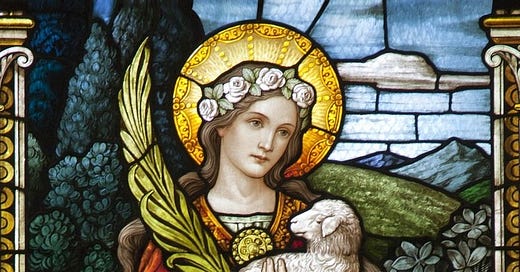Agnes was born in the AD 290s, and died during the Diocletian persecution of Christians in the early 300s, when she was 12 years old.
She was born to a wealthy Christian Roman family, whose status made her desirable for the young men from the other rich families. Though, as she had consecrated her life to Christ, and taken a vow to be a virgin, she resisted their advances.
The key event in her story came when she rejected the son of a high-ranking Roman official. As part of his revenge, he reported her to the authorities as a Christian.
Agnes was then brought before a judge. She was asked to marry or offer sacrifices to pagan gods to prove her loyalty to Rome. When she refused, they offered her wealth and status, which is also rejected. According to one source, she was even offered the position of a Vestal Virgin if she renounced her faith, but she remained faithful to her vow.
Vesta was a central goddess in Roman life. She symbolised domestic and civic stability. The eternal flame was linked to the prosperity of Rome, and the Vestal Virgins were instructed to maintain it. This was a privilege, as only noble women were allowed to take up this position. Offering this to Agnes was a great honour. Rejecting it would have been interpreted as offensive.
So as punishment, Agnes was dragged naked through the streets to the nearby brothel. This was a common method to break Christian virgins. As she was stripped bare, who hair miraculously unbraided and covered her modesty.
Upon entering the brothel, an angel shrouded her in a bright light, hiding her from those who intended to have her. Some patrons even worshipped the angel. When the son of the Roman prefect called those who worshipped ‘cowards’, he either died or was struck blind (depending on the tradition). This enraged the prefect and he put her on trial once again, with accusations of sorcery.
She defended herself, and to prove she wasn’t a witch, the prefect demanded she restore his son. She lay prostrate on the floor and prayed. His son was miraculously restored.
The story of this event became the talk of Rome, which caused the rulers to become concerned about the implications. And so they condemned her to death through being burnt alive.
As she was thrown on the pyre, the fire divided in two, and she wasn’t burned. So in frustration, the prefect removed her from the fire and she was beheaded.
According to the Acts of St Agnes, written in the Medieval period, she is quoted as saying, “It is wrong for the bride to keep the bridegroom waiting. He who chose me first shall be the only one to have me. What are you waiting for, Executioner? Destroy this body, for unwanted eyes desire it.”
St Agnes is usually pictured with a lamb. This is partly because she appeared in a vision to both her parents soon after her death. In this, she was holding a lamb, reassuring them of her place with Christ in Heaven.
I find her story deeply moving. And how it was clearly God’s will that she should not die. But human authorities ignored the will of God, like the Exodus Pharaoh. And just like how Pharaoh was defeated and the Children of Israel left Egypt, within a few years of her death, the Roman Empire started its conversion to Christianity with the Edict of Milan in AD 313.
I’m not saying that the martyrdom of St Agnes led to the conversion of the Empire, but it must of played a significant factor, as Constantina (Emperor Constantine’s daughter) built a church over her tomb in 350AD. Within 30 years of this, Christianity became the state religion of the Roman Empire.
I wonder if the execution of a daughter from high ranking family in Rome caused the cultural elites to reassess their attitude towards Christians. Resulting in the ‘de-criminalisation’ of Christianity within a decade after her death.
Martyrdom comes from the Greek word to ‘act as a witness’. So in some way, all Christians are called to be witnesses or martyrs for Christ. All the Church martyrs ever did was not compromise the witness of the love of Christ, and did so unto death.
Most Christians do not live in a society which would call for their death if they witnessed their faith, but in those parts of the world which does, they need our prayers to remain faithful when the trials and temptations come.
Even in our Western cultures, we may not receive physical attacks because of what we believe, but we can experience intolerance and be culturally disadvantaged. With some Christians criminally charged for declaring their faith online and in the real world.
St Agnes did not compromise. And if we want to see our family, friends and culture move towards Christ, then like her we shouldn’t compromise.




